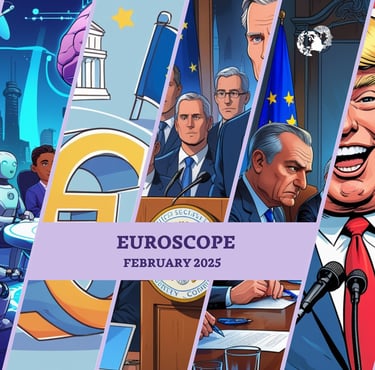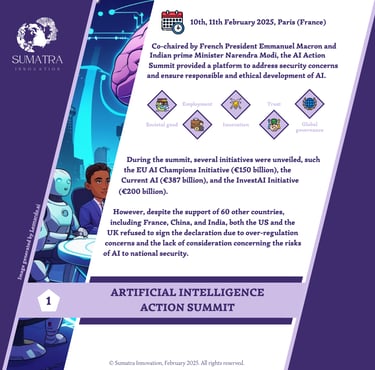Euroscope / February 2025



1/ Artificial Intelligence Action Summit
Co-chaired by French President Emmanuel Macron and Indian Prime Minister Narendra Modi, the AI Action Summit in Paris brought together over 1,000 participants from more than 100 countries, including government representatives, international organizations, academia, industry, standardization bodies and civil society. It follows on from the previous summits in Bletchley Park (United Kingdom in November 2023) and Seoul (South Korea in May 2024) to address security concerns and ensure the responsible and ethical development of AI. The discussions, which revolved around five key themes - harnessing AI for societal good (1), impact of AI on employment and labor markets (2), innovation and culture (3), trust in AI (4) and global AI governance (5) - aimed to establish scientific foundations, solutions and standards for more sustainable AI in the service of collective progress and the public interest. During the summit, the EU AI Champions Initiative, a consortium of over 60 European companies (e.g., ASML, Airbus, Mistral AI, Siemens, Spotify, Volkswagen, L'Oreal Group) led by General Catalyst, which has committed to investing €150 billion in AI-related businesses and infrastructure across Europe over the next five years, and Current AI, a partnership between eleven national governments and industry players, which aims to provide an initial investment of €387 million for projects of public interest, were unveiled. The President of the European Commission, Ursula von der Leyen, also presented the €200 billion “InvestAI Initiative” program and the project to build four AI gigafactories for training complex, large-scale models. The goal of simplifying the rules and implementing them in a business-friendly manner was reaffirmed by Macron and EU digital chief Henna Virkkunen. However, despite the support of 60 other countries, including France, China and India, different perspectives were revealed. Both the US and the UK refused to sign the declaration on “inclusive and sustainable” AI. They argued that excessive regulation could stifle innovation in the AI sector and that not enough practical clarity has been provided on global governance and the challenges AI poses to national security.
2/ Public consultations on the next EU long-term budget
As part of the Commission's preparations for the next Multiannual Financial Framework (MFF), which will start in January 2028, and following the presentation of the European Commission's vision for the next MFF, seven public consultations have been launched and will run until May 7, 2025. The aim is to gather the views of interested parties (e.g., national authorities and institutions, regional and local authorities, beneficiaries of EU funds, citizens, businesses, civil society organizations, universities) on the priorities of the budget and the policy areas to be supported, covering various policy areas such as cohesion policy, competitiveness, agriculture, civil protection, cross-border education and youth initiatives. In parallel to this consultation period, 150 European citizens will be selected to participate in the European Citizens' Panel for a new European budget, providing advice and concrete recommendations. This is particularly important as the long-term EU budget is subject to consistent changes due to the financial and geopolitical context in which the EU finds itself. As such, the budget will be based on the national plans of each EU Member State to ensure that investment, reform and transition objectives are in line with common EU policies and overall EU priorities. While this will most likely bundle the European Regional Development Fund and the European Social Fund, it will take power away from regional and local authorities, who have announced their opposition to such changes. Following the consultations, the Commission plans to present a formal proposal for the next MFF in July 2025.
3/ Munich Security Conference
The 61st Munich Security Conference (MSC), the annual forum that brings together world leaders, policymakers and security experts to discuss pressing international security issues, had a profound impact on the European Union. As European leaders expressed concern over the US administration's approach to the Ukraine crisis and pointed out that Europe must take more responsibility for its own defense and security, the US stood by its decision to exclude Ukraine and its European allies from negotiations on Ukraine's future. This exclusion has not only alarmed but also humiliated European leaders and revealed a Europe that is losing its ability to act in global affairs. Moreover, this year's conference, normally intended as a family reunion to assess the state of the transatlantic partnership, felt more like a family disunion. US Vice President J.D. Vance's speech came as a shock to Europeans as he questioned Europe's interpretation of free speech, criticized its unwillingness to curb “out-of-control migration” and castigated the German liberal democratic parties' refusal to work with the far right. While his European counterparts denied Vance's accusations, Ukrainian President Volodymyr Zelenskyy saw this speech as a wake-up call for Europe, or as he put it: “The old days are over – when America supported Europe just because it always had.” Throughout the discussions, a consensus emerged that EU member states need to increase their defense spending while strengthening NATO ties. However, the challenges posed by increasing illiberalism and polarization within the EU were also highlighted, pointing out that this could undermine the EU's ability to act coherently and uphold liberal values.
4/ EU leaders convene emergency summit amid US-Russia peace talks
Following the confirmation of the peace talks between the USA and Russia in Saudi Arabia concerning the ongoing conflict in Ukraine, and the exclusion of the European states and Ukraine from the negotiating table, French President Emmanuel Macron convened an emergency summit in Paris. One day before the meeting between Mark Rubio, the US Secretary of State, and Sergey Lavrov, the Russian diplomat and former Foreign Minister, France, Germany, the UK, Italy, Poland, Spain, the Netherlands and Denmark, as well as the NATO Secretary General and the Presidents of the European Council and the European Commission (thus forming the Weimar + Alliance) met to discuss Ukraine and security in Europe. The crisis meeting appeared as a unified response to Washington's unilateral initiative, which is crucial if Europe is to play a decisive role in resolving the Ukraine conflict, strengthening its sovereignty and reasserting its geopolitical influence. During the talks, it was agreed that the EU will continue to support Ukraine until a “just, comprehensive and sustainable peace” is achieved, that any peace agreement must protect both Ukrainian and wider European security interests, that European leaders will participate in all negotiations on Ukraine's future, and that they will commit to increasing defense spending and improving collective security measures.
5/ EU responds to Trump's tariffs announcement
After US President Donald Trump announced tariffs on its neighbors (i.e., Canada and Mexico) and a 10% tariff on China, the Trump administration unveiled the Fair and Reciprocal Tariff Plan (FRTP). The plan calls for the introduction of 25% tariffs on all EU imports, including cars as well as steel and aluminum, to offset the bloc's trade surplus with the US. This prompted a rebuttal from Polish Prime Minister Donald Tusk, who said on X that "The EU wasn’t formed to screw anyone. Quite the opposite. It was formed to maintain peace, to build respect among our nations, to create free and fair trade, and to strengthen our transatlantic friendship. As simple as that.” A declaration supported by the President of the European Parliament, Roberta Metsola, who stated that "we are not out to screw anyone" and that both sides should be "pulling ourselves up together rather than the opposite." The European Commission, Ursula von der Leyen, also promised a firm and immediate response and that such unjustified obstacles to free and fair trade would not go unanswered. An announcement that was supported by Spanish Prime Minister Pedro Sánchez, adding that "We are going to defend our interests when our economies are attacked with tariffs that are completely unjustified and represent a veiled threat to our economic sovereignty. We are committed and prepared to do so." So, there are two possible solutions. Firstly, the EU could strike back and insist on its positions. This would mean imposing tariffs on politically sensitive US exports to put pressure on American industry (e.g., textiles, well-known brands, agricultural products). At the same time, trade negotiations with other partners should be accelerated to diversify markets and reduce dependence on US trade, as exemplified by the recent EU-India free trade agreement. Secondly, the alternative is to avoid a “trade war” and give Trump what he wants. For example, regulations could be simplified and there should be clear signals that the EU is willing to buy more American natural gas and defense equipment.




